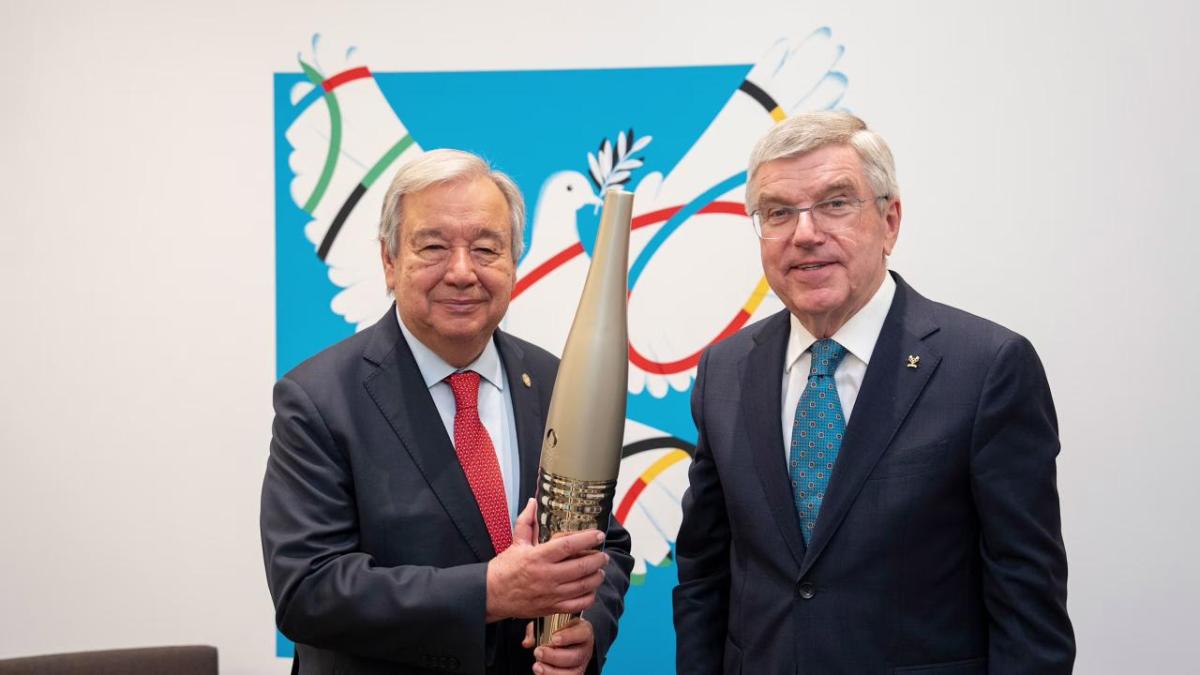IOC President and United Nations Secretary-General Meet in Paris
Published 08-05-24
Submitted by International Olympic Committee
International Olympic Committee news
On Friday, International Olympic Committee (IOC) President Thomas Bach welcomed United Nations (UN) Secretary-General António Guterres just ahead of the Opening Ceremony of the Olympic Games Paris 2024.
The two leaders discussed the Olympic Games, but also the geopolitical situation, the role of sport in advancing the UN Sustainable Development Goals (SDGs) and other topics of mutual interest. Following their meeting, they addressed the media.
IOC President Thomas Bach:
Good afternoon, ladies and gentlemen.
I just had a meeting with the UN Secretary-General – and, I may say, our dear friend, Mr Guterres, because he is a true believer in and a great promoter of the Olympic values and what the Olympic Games stand for and what the IOC stands for. And this is why we are always very honoured and happy to be able to welcome him at any occasion, but in particular, of course, at the Olympic Games.
This gave us the opportunity to discuss the extremely complicated geopolitical situation and also to explain how the IOC is approaching this situation by keeping its political neutrality. And thanks to this political neutrality and all the measures around that, I could report to the Secretary-General that, tonight, we will have the athletes from the territories of all 206 National Olympic Committees united together with the IOC Refugee Olympic Team.
And, in this way, send a very strong message for peace and unity in this world, as the athletes already did this week, with a call for peace in the Olympic Village, and as they showed this morning when I had the pleasure of running with the Olympic torch – where they were all lining up and showing their commitment to the Olympic values and to peace in this respect.
I could also thank the Secretary-General for all the support and the great cooperation we enjoy with all the United Nations agencies in order to live up to the role the UN gave us as an important enabler to achieve the UN Sustainability Development Goals. And also thank him, therefore, for the presence of all these agencies yesterday at the Summit organised by France and the IOC on sustainable development in and through sport, which was a great success, and which created a great awareness for the need to act, but also great awareness for what the IOC and what the Olympic Movement are doing and effectuating in this respect, not only when it comes to peace, but also to health, sustainable development, education and many other things.
And then finally, I expressed the hope that the UN Member States will also, in the upcoming resolution on the UN Summit of the Future, express what they expressed yesterday – the recognition of the work that we have achieved with and through the Olympic Movement with the assistance of the UN agencies, and also encouragement to continue in this way.
Welcome, Mr Secretary-General, to your home, the Olympic Movement.

UN Secretary-General António Guterres:
Thank you very much.
I want to express the deep support – the total support – of the United Nations to the International Olympic Committee.
We live in a divided world, where conflicts are proliferating in a dramatic way.
The horrendous suffering in Gaza, the seemingly endless war in Ukraine, terrible suffering from Sudan to the DRC [Democratic Republic of the Congo], from the Sahel to Myanmar.
And in a moment like this, it's important to say that the first real peace initiative recorded in history was the Olympic Truce.
And so, at a moment in which the Olympic Games are going to start, it's time to remind the world of the importance of the Olympic Truce and to make the world understand that we must silence the guns.
Nothing is more contrary to conflict than the Olympic experience.

The Olympic Games are a symbol of universality and diversity.
A symbol of cooperation and loyal competition, instead of division and conflict.
And so, this is the moment in which my strong appeal is for countries to come together with the same spirit as athletes, who will be coming together during the Olympic Games in fairness.
I would like to express my deep gratitude for what the International Olympic Committee has done to allow a refugee team to compete in the Olympics once again. I was High Commissioner for Refugees for 10 years, and it's important to leave no one behind, and not to leave behind those who were forced to flee, to leave their countries, and have the same rights to practise sport as any other citizen of the world.
[In addition], the Olympic Games are showing a remarkable example in their commitment to sustainability and to the Sustainable Development Goals.
I believe that the events themselves will be carbon neutral, which is a remarkable achievement.
And I also know, in this context of protection of the vulnerable people in the world, that an enormous effort was made to facilitate the access of people with disabilities to fully enjoy the Olympic Games in Paris.
And so, once again, I want to express our support to the International Olympic Committee.
And our wish is that these Olympic Games in Paris, la Ville lumière, will be a fantastic success.

International Olympic Committee
International Olympic Committee
The International Olympic Committee (IOC) is a not-for-profit independent international organisation that is committed to building a better world through sport. It redistributes more than 90 per cent of its income to the wider sporting movement, which means that every day the equivalent of USD 3.4 million goes to help athletes and sports organisations at all levels around the world.
As the leader of the Olympic Movement, the IOC acts as a catalyst for collaboration between all parties of the Olympic family, from the National Olympic Committees (NOCs), the International Sports Federations (IFs), the athletes and the Organising Committees for the Olympic Games (OCOGs) to the Worldwide Olympic Partners, broadcast partners and United Nations (UN) agencies, and shepherds success through a wide range of programmes and projects. On this basis, it ensures the regular celebration of the Olympic Games, supports all affiliated member organisations of the Olympic Movement and strongly encourages, by appropriate means, the promotion of the Olympic values.
More from International Olympic Committee

